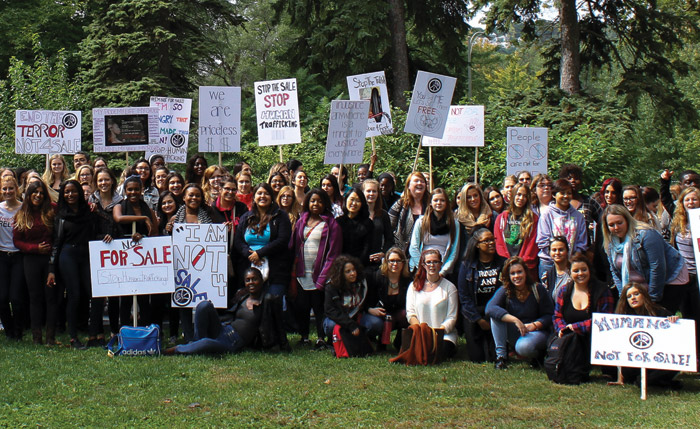Last Wednesday, students at Dawson College participated in workshops and held a demonstration to raise awareness about human trafficking.The event was organized by members of McGill’s International Relations Students’ Association of McGill (IRSAM), Sustainable Dawson—a student group at Dawson—and En Marche!, the provincial representation of the Freedom Relay Canada (FRC) organization.
According to the FRC website, their main objective is to “strengthen resilience—build protective factors—against risk by empowering students as well as their community to act and respond appropriately” to issues of domestic human trafficking and forced prostitution.
The day began with a series of teach-ins, where students attended multiple 25-minute long information sessions held by FRC’s partner organizations. Representatives from the Service de police de la Ville de Montréal (SPVM)’s Survivantes (the Survivor Project), a program geared towards the SPVM and other organizations tackling the issue of human trafficking, put on presentations using victim and trafficker profiles.
“The relay itself is a public engagement program,” said Matthew Patterson, a student at Dawson and one of the organizers of the event.
Human trafficking is the second largest criminal activity in Montreal after the illegal drug trade, and most of the people involved with prostitution in Montreal are forced into the situation, according to an article in Global News. The teach-ins at the event aimed to educate students about such issues in Canada and also to inform them about risk factors and warning signs.
“We put together this project because we had a lot of victims coming in, through domestic violence that wasn’t domestic violence—they were sex trade victims,” said Diane Veillette, agent de concertation of the SPVM.
She continued to highlight how traffickers often manipulated and exploited victims.
“[The victims] think [the traffickers are] their boyfriend or their husband, they think that they’re going to have a lifetime with that person,” she said. “Sometimes it was hard for even police to target these files.”
Veillette continued to stress the importance of an integrated approach towards identifying victims of the sex trade and giving them resources.
“These files cannot be worked only by police service,” Veillette said. “It absolutely needs to be done in partnership with members of the community. We need to make sure we put a safety net around the victims.”
Other information sessions were geared towards social workers and people who work in youth homes or shelters.
At the Freedom Relay event, SPVM’s Survivantes project discussed the laws regulating prostitution in Canada, where prostitution is not illegal, but trafficking or controlling the sex trade for money is.
“A lot of our victims fear the legal aspect, and we understand that,” said Veillette. “When we talk about this project, we’re not for or against prostitution [….] We’re against people being trafficked. Some people are in the field because they’ve chosen to. But we know that a majority of the girls have issues or are being forced, so that’s where we come in.”
Many organizations pointed out that the risk factors for youth—especially young girls—for falling into the sex trade included poverty, loneliness, and coming from an abusive family.
Other representatives from non-profit organizations, such as the Batshaw Youth and Family Services Centre, YMCA Premier Arret/First Stop Initiatives, the Quebec Native Women Inc., and the Committee of Action Against Human Trafficking National and International (CATHII) also discussed how their groups played a role in helping afflicted and at-risk individuals.
Premier Arret/First Stop by the YMCA, for example, is stationed at the Gare d’autocars, and they give information and resources to youth who are new in Montreal, to mitigate their risk of homelessness, or other risk factors for trafficking.
The teach-ins were followed by an outside vigil in Sustainable Dawson’s Peace Garden.
“In lighting this candle, we hope to commemorate [the victims of trafficking],” Patterson told the crowd of students. “Their strength and resilience is beyond that which I could ever comprehend. Let this be a beacon of hope for peace, unity, love, and respect among all of us.”
The final part of the day was an hour-long demonstration down Maisonneuve Street, from Atwater to Bishop Street. Students drew attention by chanting “My body, my choice,” and “Montreal is the third largest hub of trafficked people in Canada.”
“I’ve known people that have been connected [to trafficking]—girls, friends,” said Allia Davis, a first year Social Services student at Dawson College and a participant in the march. “I know this is something that is a problem right here at home [….] I don’t have to go to a third-world country. People need to be more conscious of this.”
“[The event] came together really well,” said Jessica Mink, a U3 Arts student at McGill who led the group of IRSAM volunteers from their local outreach branch in organizing the event. “We saw overall about 200 people come through these workshops today.”
According to Mink, McGill may host a similar event on campus in the future.
“[FRC] is moving to make this a student-run initiative next year, so they really want to get McGill students, Concordia students, and Dawson students involved in running this,” Mink said. “We were really excited about this activity, because it takes an educational approach. It is something with a positive message: That education can really make a change.”









